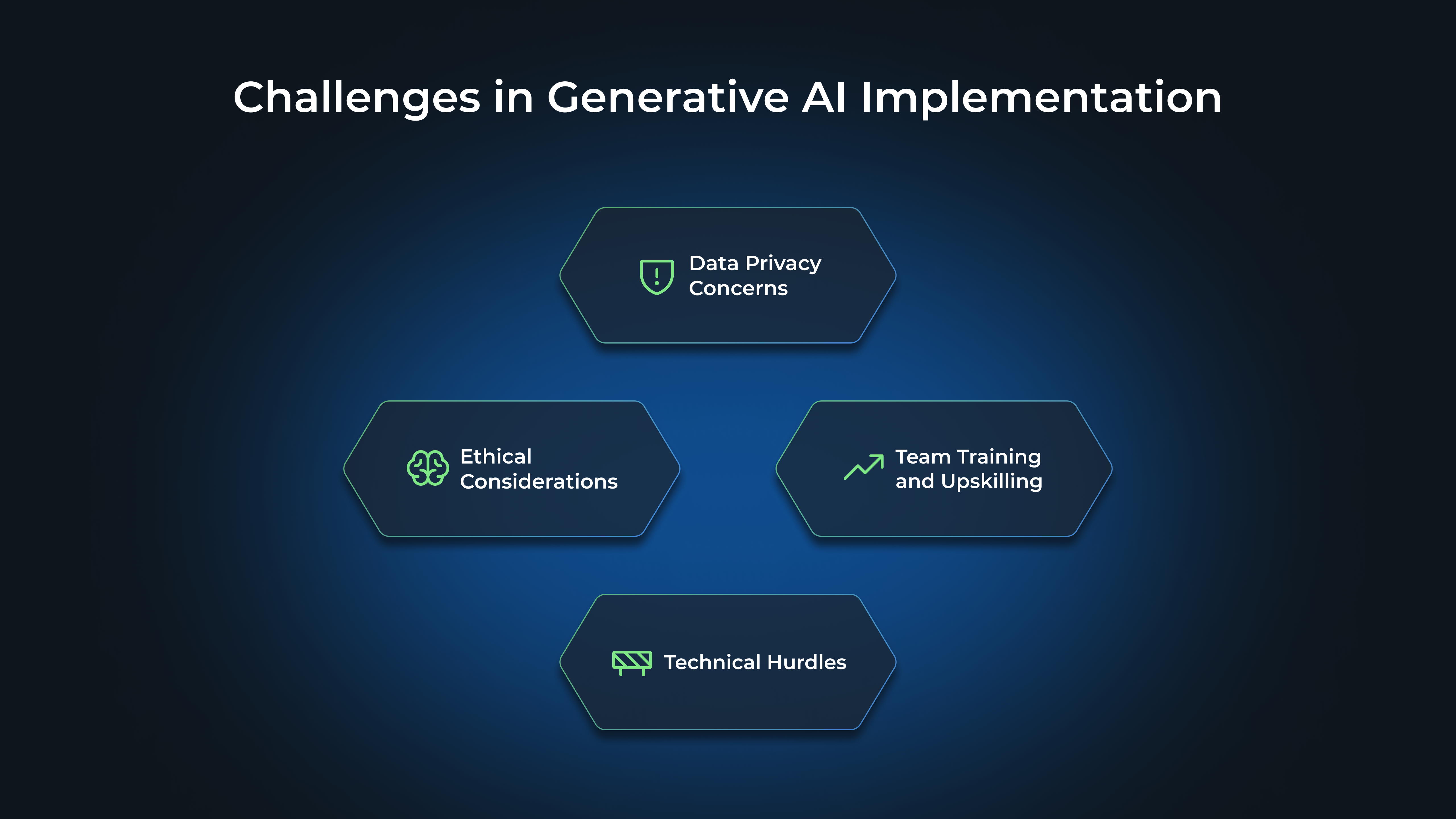Generative AI, also known as generative adversarial networks (GANs), is revolutionizing various industries, and the business sector is no exception. This cutting-edge technology has the potential to transform how companies operate, streamline business processes, and enhance decision-making. In this article, we will delve into the world of generative AI and explore how it can significantly benefit your business operations.
What is Generative AI?
Generative AI stands at the forefront of cutting-edge technology, representing a captivating domain within machine learning that merits a closer examination. In essence, it encompasses a set of techniques enabling computers to generate content – encompassing images, text, and music – with a striking resemblance to human-created output. At its core, generative AI operates through two fundamental components: the generator and the discriminator. The generator, akin to an artist, utilizes intricate algorithms to craft data samples mirroring real-world examples, delving into the analysis of patterns and structures within existing data to birth something novel.
On the other side, the discriminator plays a pivotal role, discerning between generated and authentic content by scrutinizing various features and characteristics. This iterative process, a dynamic interplay between creation and critique, refines both components, culminating in outputs virtually indistinguishable from human creations. Striking a balance between creativity and realism poses a key challenge for generative AI, requiring a profound understanding of underlying patterns in training data and the capacity to extrapolate and generate innovative yet believable content.
Over the years, generative AI techniques have evolved with strides in deep learning and neural networks, paving the way for sophisticated and realistic models. Today, the applications of generative AI span diverse fields, from image synthesis and text generation to music composition and video game design, promising to revolutionize industries with its transformative capabilities.
The Impact of Generative AI on Business Operations
Generative AI is a transformative force in today’s data-centric business world, offering businesses significant advantages. By generating synthetic data that mirrors real-world information, companies can augment datasets, enhancing predictive model accuracy. This addresses limitations of limited or biased datasets, unlocking new possibilities for machine learning training and performance improvement. Additionally, generative AI contributes to personalized content creation, improving user experiences and boosting customer engagement. Beyond data, it serves as a powerful tool for creativity, aiding designers and artists in generating innovative ideas and compelling designs. In essence, generative AI is rapidly evolving, reshaping content creation and interaction across industries, with ongoing research and development promising even more exciting applications in the future.
Now that we’ve grasped the fundamentals of generative AI, let’s explore its profound impact on business operations.
Generative AI, with its ability to generate new and unique content, has revolutionized the way businesses operate. It has become a game-changer in streamlining business processes and enhancing decision-making. Let’s delve deeper into these two aspects:
Business Processes with Generative AI
We at WeSoftYou have observed firsthand how generative AI can streamline business processes, leading to increased efficiency and productivity. By automating repetitive tasks, such as data entry and analysis, generative AI frees up valuable time for employees to focus on more strategic and value-added activities.
Imagine a scenario where a company receives thousands of customer inquiries every day. Traditionally, employees would spend hours manually sorting and categorizing these inquiries. However, with generative AI, natural language processing algorithms can analyze and categorize these inquiries in real-time, saving countless hours of manual work.
Additionally, generative AI can optimize supply chain management, inventory forecasting, and demand planning. By analyzing historical data, market trends, and customer behavior patterns, generative AI algorithms can accurately predict demand, ensuring that businesses have the right amount of inventory at the right time. This minimizes costs associated with overstocking or stockouts and improves customer satisfaction.
Decision Making with Generative AI
From our experience, one of the significant benefits of generative AI lies in its ability to enhance decision-making processes. By leveraging the power of machine learning algorithms, businesses can generate accurate simulations and scenario-based models, allowing decision-makers to assess potential outcomes with greater precision.
For example, imagine a retail company planning to open a new store location. Traditionally, decision-makers would rely on market research reports and their intuition to make informed decisions. However, with generative AI, they can simulate different scenarios, taking into account factors such as demographics, competition, and consumer behavior. This enables them to make data-driven decisions, minimizing risks and maximizing the chances of success.
Generative AI also assists senior leaders, such as founders, CTOs, and CEOs, in formulating informed strategies, mitigating risks, and capitalizing on emerging opportunities. By analyzing vast amounts of data and identifying patterns, generative AI algorithms can provide valuable insights and recommendations, empowering leaders to make informed decisions that drive business growth.
In conclusion, generative AI has transformed business operations by streamlining processes and enhancing decision-making. Its ability to automate tasks, optimize supply chains, and provide accurate simulations has become a valuable asset for businesses across various industries. As this technology continues to evolve, we can expect even greater advancements and opportunities for businesses to leverage generative AI for their success.
Generative AI Implementation
Now that you understand the potential of generative AI, you may be wondering how to integrate this technology into your business operations.
Generative AI, also known as creative AI, is a branch of artificial intelligence that involves using algorithms to generate new and unique content. This technology has the ability to create music, art, text, and even entire virtual worlds. By harnessing the power of generative AI, businesses can unlock new opportunities for innovation, creativity, and personalization.
When considering the implementation of generative AI, it is crucial to establish a clear roadmap. Begin by identifying specific areas in your business where generative AI can add value, such as product development, content creation, or customer personalization.
For example, in product development, generative AI can be used to generate new design concepts based on user preferences and market trends. This can help businesses stay ahead of the competition by continuously offering fresh and innovative products.
In content creation, generative AI can assist in generating engaging and personalized content for marketing campaigns. By analyzing customer data and preferences, the technology can create targeted advertisements, blog posts, and social media content that resonates with your audience.
From there, collaborate with experts, like the experienced team at WeSoftYou, to develop a tailored implementation strategy. These experts can help you understand the technical requirements, select the right tools and frameworks, and ensure a smooth integration with your existing systems.
Test the technology in controlled environments, closely monitor performance, and iterate as necessary to optimize results. This iterative approach allows you to fine-tune the generative AI algorithms and ensure they align with your business goals and objectives.
Challenges in Generative AI Implementation

Implementing generative AI may come with its fair share of challenges. It is essential to address concerns related to data privacy and ethical considerations. As generative AI relies on large amounts of data, it is crucial to have robust data protection measures in place to safeguard sensitive information.
- Data Privacy Concerns:
- The reliance of generative AI on extensive data raises significant concerns regarding data privacy. Robust measures must be in place to protect sensitive information, ensuring compliance with privacy regulations.
-
Ethical Considerations:
- Ethical considerations are paramount in generative AI implementation. Striking a balance between innovation and ethical standards is crucial to avoid unintended consequences or misuse of the technology.
-
Team Training and Upskilling:
- Introducing generative AI requires a skilled workforce. Training programs, workshops, or hiring experts are essential to empower teams with the knowledge and proficiency needed to leverage generative AI effectively.
-
Technical Hurdles:
- The implementation of generative AI may face technical challenges. Partnering with an experienced software development company can be instrumental in overcoming technical hurdles, ensuring a seamless integration process.
By partnering with an experienced software development company like WeSoftYou, you can navigate these challenges successfully and capitalize on the full potential of generative AI for your business. With their expertise in AI development and implementation, they can help you overcome technical hurdles, ensure data privacy, and maximize the benefits of generative AI.
Future Prospects of Generative AI in Business
As generative AI continues to evolve, its future prospects in the business world are vast. The potential applications of this technology are far-reaching and have the potential to revolutionize various industries.
One area where generative AI is expected to make significant advancements is in natural language processing. As machines become more adept at understanding and generating human-like text, businesses will be able to leverage this capability to automate content creation. Imagine a world where AI-powered bots can write high-quality articles, blog posts, and even books, saving businesses time and resources.
Furthermore, generative AI is predicted to play a pivotal role in personalized marketing campaigns. With the ability to analyze vast amounts of data and generate tailored content, businesses will be able to deliver highly targeted messages to individual customers. This level of precision and customization will undoubtedly enhance customer engagement and drive sales.
Another exciting prospect for generative AI is its potential in virtual reality (VR) and augmented reality (AR) experiences. By leveraging generative AI algorithms, developers can create immersive and lifelike virtual worlds, enhancing the user experience. From realistic characters and environments to interactive storytelling, generative AI has the power to transform the way we engage with VR and AR.
Predicted Trends in Generative AI
From our analysis, we anticipate several trends that will shape the future of generative AI.
-
Advancements in Natural Language Processing (NLP):
- Anticipate significant progress in NLP within generative AI, empowering machines to produce high-quality written content. This trend will revolutionize content creation processes, enhancing efficiency and creativity.
-
Personalized Marketing Campaigns:
- Generative AI is expected to take center stage in personalized marketing campaigns, allowing businesses to precisely tailor messaging and offerings to individual customers. This trend promises unprecedented levels of customization and engagement.
-
Immersive Virtual Reality (VR) and Augmented Reality (AR) Experiences:
- Generative AI is poised to unlock new dimensions in VR and AR experiences, facilitating immersive and lifelike interactions. This trend will redefine user engagement, offering novel possibilities in entertainment, training, and beyond.
-
Cross-Industry Impact:
- The influence of generative AI will extend across diverse industries, including healthcare, finance, and entertainment. In healthcare, it can contribute to drug discovery, medical imaging analysis, and patient diagnosis. In finance, applications range from fraud detection to risk assessment and investment strategies. In entertainment, generative AI can revolutionize character creation, special effects, and original music compositions.
With the continuous development of generative AI, the possibilities are endless. It is crucial for businesses to stay updated on the latest trends and advancements in this field to remain competitive in the market.
Conclusion
Implementing generative AI into your business requires careful planning and consideration. It is essential to identify areas where this technology can bring the most value and align it with your business goals. Whether it’s automating content creation, personalizing marketing campaigns, or enhancing virtual reality experiences, understanding the specific applications of generative AI for your business is key.
WeSoftYou, with its proven track record in software development, is well-equipped to assist businesses in their generative AI journey. Our team of experts stays up-to-date with the latest advancements in AI technology and can guide you through the process of integrating generative AI into your business operations.
Contact us today for a free consultation or project estimation, and let us guide you through this transformative journey. Together, we can unlock the full potential of generative AI for your business and stay ahead of the competition.
FAQ
Generative AI, short for Generative Artificial Intelligence, refers to a class of artificial intelligence systems designed to generate new content or information. Unlike traditional AI systems that rely on pre-programmed rules, generative AI uses machine learning techniques to analyze and learn from large datasets, enabling it to create original and contextually relevant content. This can include generating images, text, music, or even entire virtual experiences. Generative AI has applications across various industries, from content creation and marketing to healthcare and entertainment, showcasing its ability to produce novel and creative outputs.
Generative AI has applications across various industries, including healthcare, finance, retail, and creative sectors like art and design.
Generative AI is revolutionizing the healthcare industry by enabling the creation of personalized treatment plans based on patient data. It is also being used in finance to predict market trends and optimize investment strategies. In the retail sector, generative AI is helping businesses create customized shopping experiences for their customers. Moreover, in the art and design field, generative AI is being used to generate unique and innovative designs that push the boundaries of creativity.
By generating accurate simulations and scenario-based models, generative AI provides decision-makers with valuable insights and helps them make more informed choices.
Generative AI can simulate various scenarios and predict their outcomes, allowing decision-makers to assess the potential risks and benefits of different options. This technology can be particularly useful in complex decision-making processes, such as supply chain optimization, resource allocation, and strategic planning. By leveraging generative AI, businesses can make data-driven decisions that lead to improved efficiency, cost savings, and competitive advantage.
Challenges in generative AI implementation may include issues related to data privacy, ethical considerations, and the need to upskill team members to effectively leverage this technology.
When implementing generative AI, organizations need to ensure that they have robust data privacy measures in place to protect sensitive information. Ethical considerations also arise, as generative AI algorithms have the potential to generate biased or misleading content. It is crucial to establish guidelines and frameworks to address these ethical concerns and ensure responsible use of generative AI technology.
Additionally, organizations may need to upskill their team members to effectively leverage generative AI. This includes training employees on how to interpret and utilize the insights generated by generative AI algorithms. By investing in training and development, businesses can maximize the benefits of generative AI and drive innovation within their teams.
Remember, the future of business operations lies in embracing innovative technologies like generative AI. Stay ahead of the curve and unlock the full potential of your business with the expert guidance of WeSoftYou. Contact us today for a free consultation or project estimation.





















